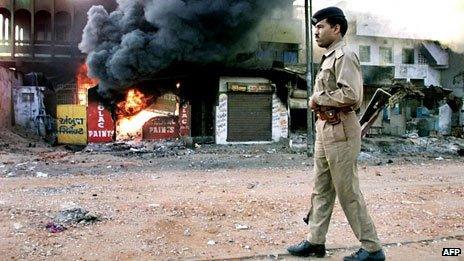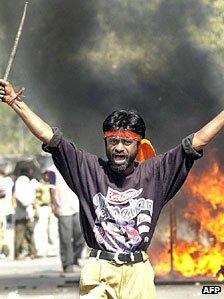India's Gujarat riots: 10 years on
- Published

BBC Hindi correspondent Rehan Fazal arrived in Gujarat on 28 February 2002, to cover religious riots that had broken out after a train carrying Hindu pilgrims the day before was set on fire, killing dozens. More than 1,000 people, mostly Muslims, died in the outbreak of violence, one of the worst since Independence.
Ten years later, he recounts the horrors of reporting the riots as a Muslim journalist.
My memory of those days has not dimmed.
I arrived in Ahmedabad, Gujarat's main city, at around 08:00 on 28 February. Disturbances had not yet broken out, but I could see people milling around, protesting at busy intersections.
As my driver and I travelled around the city, I could see a 200-strong crowd, carrying burning torches. They were shouting slogans and stopping vehicles. The moment our car stopped, it was surrounded by about 50 people.
I tried to talk to them but my driver signalled that I should keep quiet. He tried to reason with them in Gujarati - that we were from the BBC, on our way to Godhra, the station where the 59 Hindus were charred to death, to report on the deaths.
After plenty of persuasion, we were allowed to proceed. The situation was no different at Dakor where we were stopped by the police. They flatly refused to let us go further. My driver reversed the car and took a detour to Godhra.
Soon, we hit Balasinor, where we were stopped by another angry crowd. The moment the vehicle stopped, some of them charged towards me.
"Show us your identity card!" As the order was barked, from the corner of my eye I could see a man being dragged out of another car and stabbed repeatedly. He was lying in a pool of blood on the road, trying to cover his stomach with his hands.
Again, the cry came: "Where is your identity card?"
I hesitatingly took out my card - printed in English - and held it up to his face, covering my Muslim name with my thumb. Would I be subjected to the same treatment which I had just witnessed? Would I become another statistic in the scores of communal incidents that India had witnessed?
Stay or go?
One of the men in the crowd glared at me and gave my identity card a second look. Suddenly, an argument broke out among my tormenters. One of them got into my car and ordered me to record an interview. He gave me a long lecture on why Muslims were such a despicable lot.
Finally, the man got out of the car and removed the burning tyres blocking our path. To my absolute and total relief, we were allowed to move forward. It was a close shave for me. Drenched in sweat, I thanked my stars that I was still alive.

The outbreak of violence was one of the worst since India's independence
I was in two minds. Should I move further on an unpredictable journey in this volatile environment, or return to what I believed was the safety of Ahmedabad? My journalistic instincts prompted me to move on.
We eventually reached the spot where the train was attacked. Only some police personnel were around. Stones were strewn all over the place. A policeman asked me to leave immediately.
I met senior police official Raju Bhargava, who gave me the police account of how the trouble had started at 07:43 when the Sabarmati Express rolled in four hours late to Godhra station. He told me that the culprits had been arrested and the situation was under control.
My driver and I decided to return to Ahmedabad. I had planned to spend the night in Godhra but my driver prevailed upon me to return to Ahmedabad as things were bound to get worse.
About 10km into our journey, I saw a mob setting fire to some houses. I asked my driver to accelerate, but to my dismay, we discovered we had a flat tyre. It was replaced, but we then had another flat; we were standing in the middle of nowhere with no spare tyre.
My driver decided to knock at the door of a nearby house. He persuaded the people who opened the door to lend him their scooter so that he could get the flat tyre repaired.
As I sat alone in the car, waiting for the driver to return, I saw a mob heading towards our car. I quickly put my identity card, credit card and all my business cards under the carpet of the car.
By sheer chance my wife's credit card was in my wallet. I clasped it in my hand.
A man wearing a yellow headband asked me if I was a Muslim. I waved my hand in the negative. He asked for my identity card. I flashed my wife's credit card, which bore her name, Ritu. He misread it as Ritik and shouted to the mob, "His name is Ritik! Let him go!"
We soon resumed our journey towards Ahmedabad, not knowing then that the city had been hit by spiralling violence.
Not only did I survive Ahmedabad, but I managed to return to my family in Delhi without a scratch.
Ten long years have passed since I reported on the murderous riots in Gujarat. Even as I continue to count my blessings, my mind wanders to the pain and suffering of those who were not as lucky as me.
- Published27 February 2012